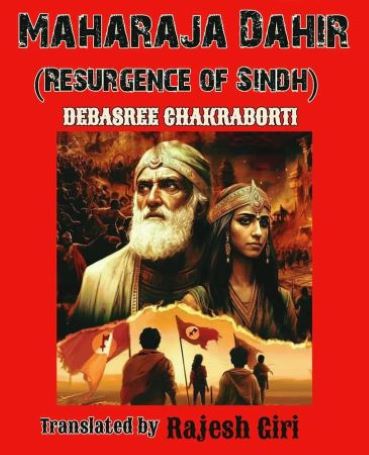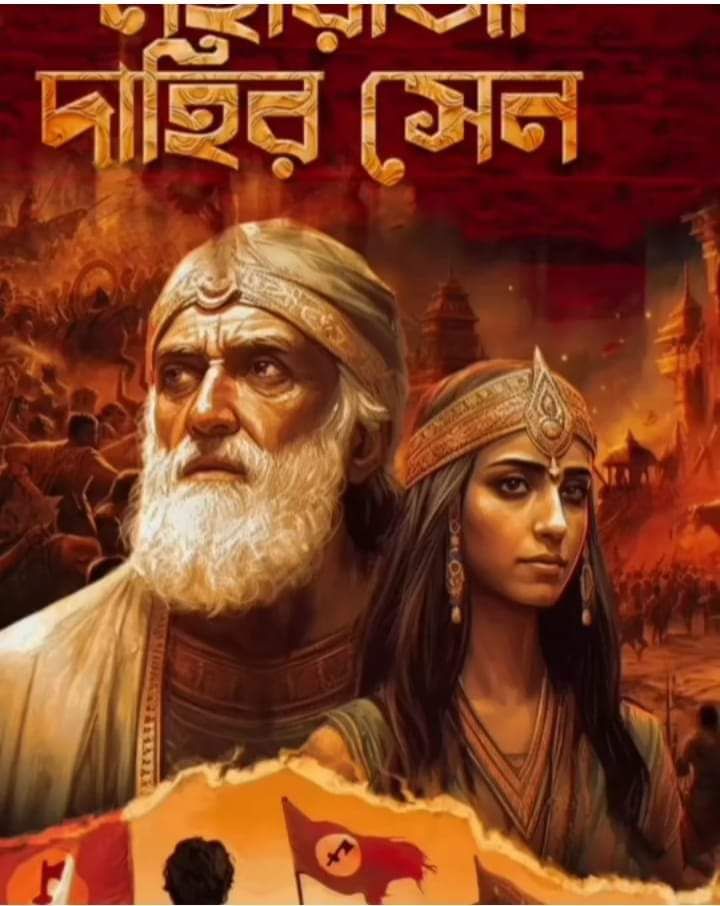
The English translation of a novel ‘Maharaja Dahir’ authored by Kolkata-based renowned novelist Debasree Chakraborti in Bengali language. The novel has been translated by Rajesh Giri
All the doors and windows of this house were closed; Sabirbhai turned on the cooler and the lights inside the room. Dr. Iqbal faced little problem to open the box, as the top lid of the box was relatively large and was very lightly fitted. When they opened the box, they found what looked like an ancient manuscript. A very strong smell was emanating from the manuscript. Sabirbhai said that the manuscript has been treated with chemicals to preserve it. Think how advanced the science was at that time. Dr. Iqbal picked up that manuscript and noticed that it is written ‘Diary of Maharaja Dahir’.
Iqbal surprisingly asked Sabir bhai, “Brother, how did you know that this diary is kept there?”
—Having accumulated a lot of experience doing these things over a long period of time, my experience told me that the manuscript is there. You read it, find out what it says, I have to take a nap surely, otherwise I won’t be able to drive.
There are two couches in this room, and a beautiful bed is placed on the couches. It is clear that as they are coming, this arrangement has been done in advance. Sabirbhai went to sleep on a bed and Dr. Iqbal sat on another couch and started reading the book.
At the beginning of Maharaja Dahir’s writing, he offered obeisance to his divine mother Kali. No date is mentioned on the diary, but he wrote it consistently. Dr. Iqbal felt that when Maharaja Dahir started writing this diary, he had no reckoning of time. He had been writing in a whirlwind.
I am writing because future generations may learn from my life’s mistakes. The present age does not obey Veda-vyakya (eternal advices), so one has to prepare accordingly to survive the battle with time and environment.
He wrote, “I could never think of that the last phase of my life will be so terrible. I know my life is coming to an end, and I am solely responsible for this outcome. My father Chach used to say that it is a great sin to lose faith in human; if someone does wrong with you, you will always do justice in return, then you will observe that change will start to happen inside him. Thus even your staunch enemy will become your ally. Father used to say that there is nothing more virtuous than giving shelter to the helpless, giving food to the hungry. I followed my father’s ideals. But my father did not know that the outsiders would never understand the greatness of his philosophy, because their philosophy is to deceit and violence. Mohammad Alafi sought refuge to me. I gave him shelter, but I do not perceived his deception.

I see the terrible fate of the country of Sindh. Yet I will fight, I will fight as long as I am alive.
He gradually gained my trust and began to spread his dominion throughout the kingdom. And gradually he introduced thousands of Arab warriors into the country of Sindh in disguise. Then some traitors from our Sindh country were taken to Arabia bribing them with huge money to train the Arabs in the language and culture of Sindh so that they could not be recognized even if they live together with the common Sindh citizens. Alafi’s troops have learned all our defence mechanism from our troops. Alafi minted coins in his own name in return for a small contribution to the security of the Indus country. I continued to help him as our best friend, but he exploited my simplicity. Mohammed bin Qasim invaded to enslave Sindhis to Arabia, but my father taught me that the guest is Narayan (embodiment of God), not to starve him. I saw my arch enemy as Narayana. When the Arab soldiers were spending the day in isolation with no food to eat, no water to drink, I started supplying them with food and water. Consuming the food I provided, they have grown stronger and are now preparing to attack me. Alafi, whom I thought, was my best friend, abandoned me in this time of danger and joined the enemy camp. I came to know that Alafi had killed our soldiers and replaced them with Arab soldiers, and that the army of the Sindh country was full of fake soldiers. Because of this the Arabs are conquering one city after another. My son Yuvraj Jaisingh has raised an army of his chosen warriors, they are trying to defend the last, but Jaisingh’s army is too small against this huge Arab force, so they are not able to prevail. Above all, there is unity among the Arabs, which we do not have. The kings of the Arab countries are helping with arms, soldiers and resources to further their crusade. But when our Sindhumata is attacked, no one is coming forward to save her. I don’t know how much I can resist the enemies alone. Sindhu country is the wall to the entry to Hind, if Sindh ends then Hind will also end. Keeping our personal enmity and hatred aside, we must hold each other’s hands now—or everything will be over. Thousands of Sindhi women and children are being sold in the markets of Baghdad. Women and children of infidels are considered objects to fulfil their lust. They have no natural resources of their own, they will enjoy the natural resources and human resources of Sindh country. They will steal our knowledge and use it for their own development, and we will continue to sink into darkness day by day. By pushing our future generations into darkness, they will become enlightened. I am suffering greatly for my children, to follow the virtuous moral code of life, I now have pushed the life of my people, of my children into darkness. I am a complete failure as a father. I know that my defeat in this war is certain; I see the terrible fate of the country of Sindh. Yet I will fight, I will fight as long as I am alive. There is still one last hope. I have sent messengers to the kings of Hind, hoping they will help me. If the war breaks out and I fall, I know they will not spare Airavat, the elephant. In my lifetime, I already have built a tomb for my favourite pet.
I will keep this diary secretly on one side of that Samadhi temple (tomb). No one but a few people close to me will know. Many will wonder why I am writing down my current feelings. I am writing because future generations may learn from my life’s mistakes. The present age does not obey Veda-vyakya (eternal advices), so one has to prepare accordingly to survive the battle with time and environment. I have very little time in hand, I will leave my diary to my Prime Minister Budhimaan. And after a while late at night they will hide it in the right place. Because the surrounding villages are being attacked in the dark of night; the Arabs can attack us at any time. Jai Sindh Jai Hind, Goodbye.’ (Continues)
Click here for Part-I , Part-II, Part-III , Part-IV , Part-V , Part-VI , Part-VII, Part-VIII , Part-IX , Part-X, Part-XI, Part-XII, Part-XIII , Part-XIV , Part-XV , Part-XVI, Part-XVII, Part-XVIII , Part-XIX, Part-XX, Part-XXI , Part-XXII, Part-XXIII , Part-XXIV , Part-XXV , Part-XXVI, Part-XXVII, Part-XXVIII, Part-XXIX, Part-XXX , Part-XXXI, Part-XXXII, Part-XXXIII , Part-XXXIV , Part-XXXV , Part-XXXVI , Part-XXXVII , Part-XXXVIII, Part-XXXIX, Part-XL , #Part-XLI , Part-XLII , Part-XLIII , Part-XLIV, Part-XLV , Part-XLVI , Part- XLVII
____________________
 Debasree Chakraborti is a renowned novel writer of Bengali language. Based in Kolkata, West Bengal, India, she has done Master’s in Modern History from the Kolkata University, and authored some thirty books, mostly the novels, with historical perspective and themes. Her most recent novel is ‘Maharaja Dahir’ that covers the history of Sindh from 662, the year of first attack on Sindh by the Arab armies till date.
Debasree Chakraborti is a renowned novel writer of Bengali language. Based in Kolkata, West Bengal, India, she has done Master’s in Modern History from the Kolkata University, and authored some thirty books, mostly the novels, with historical perspective and themes. Her most recent novel is ‘Maharaja Dahir’ that covers the history of Sindh from 662, the year of first attack on Sindh by the Arab armies till date.
 Rajesh Giri, born in Kolkata, had his early schooling from Kolkata and then from Medinipur—a village in Bengal. He graduated from Calcutta University with Physics and Maths and Master’s from Burdwan University in 2016. Now he is associated with Adhdhyaan educational institution teaching Physics. History enthusiastic Rajesh Giri is particularly interested in the ancient civilization of India and other regions like Egypt, Mesopotamia, and North America. He loves traveling.
Rajesh Giri, born in Kolkata, had his early schooling from Kolkata and then from Medinipur—a village in Bengal. He graduated from Calcutta University with Physics and Maths and Master’s from Burdwan University in 2016. Now he is associated with Adhdhyaan educational institution teaching Physics. History enthusiastic Rajesh Giri is particularly interested in the ancient civilization of India and other regions like Egypt, Mesopotamia, and North America. He loves traveling.
[…] XLVII , Part-XLVIII , Part-XLIX, Part-L , […]